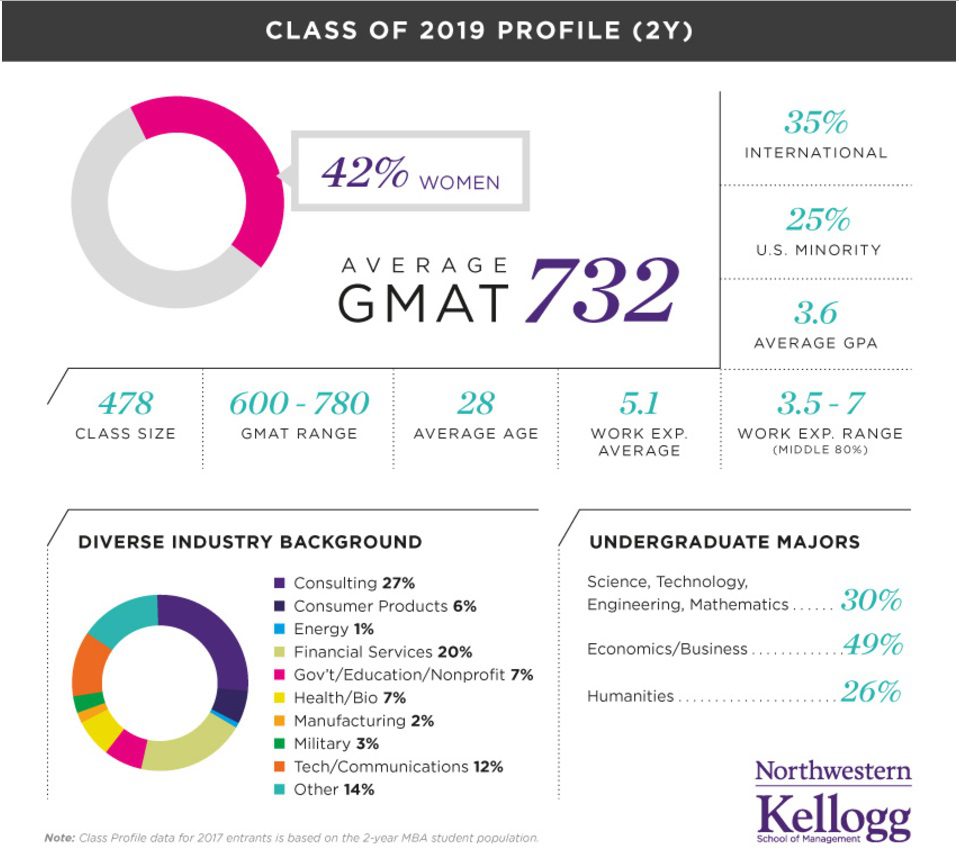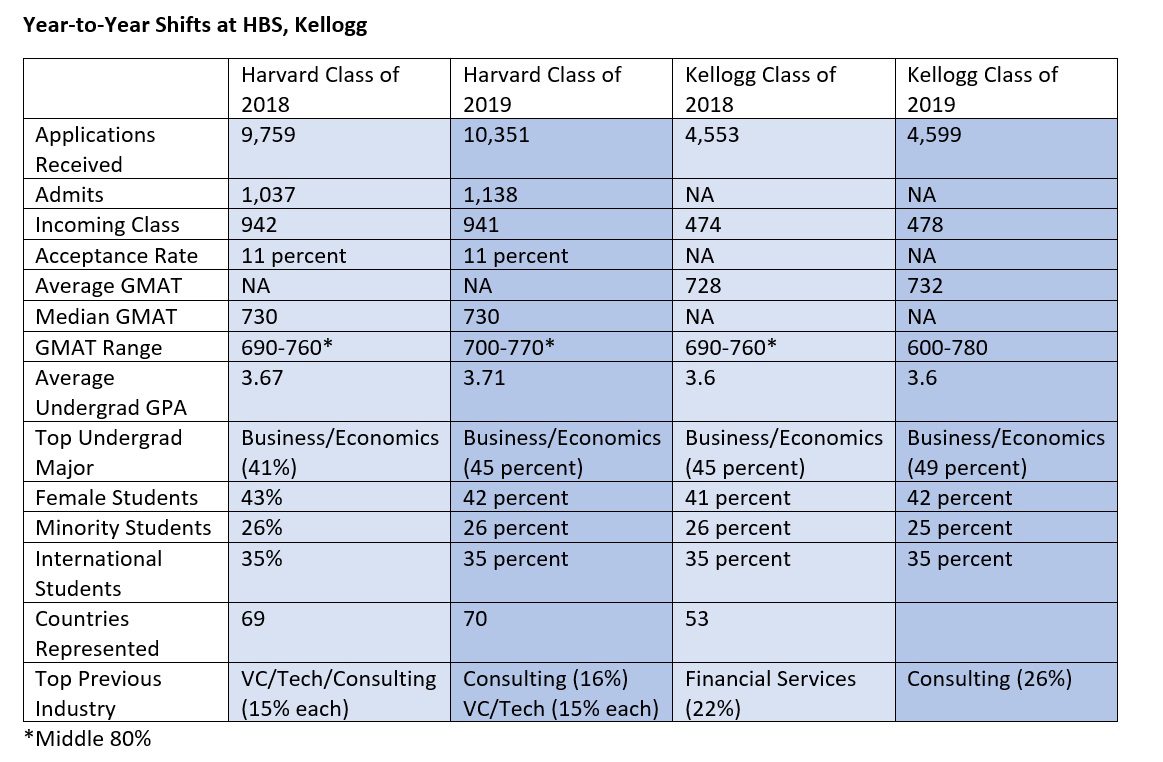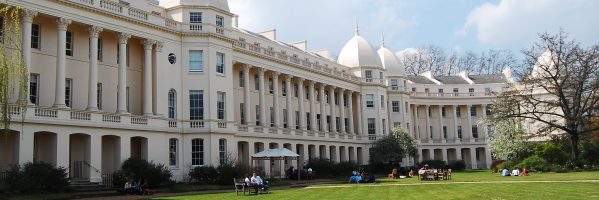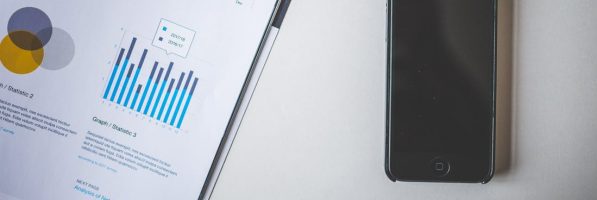HBS Class of 2019 Profile Reveals Subtle Shifts, New GRE Details

The official Harvard Business School (HBS) Class of 2019 profile is now out—capturing in numbers and pie charts the real live students who started class for the first time yesterday. Not a lot has shifted since HBS released its preliminary class profile earlier this summer, although the Class of 2019 now includes 928 students, suggesting that 13 of those the school was expecting to enroll when it originally reported the class size at 941 made other plans. There are 942 students in the Class of 2018, by comparison.
The percentage of minority students also slipped slightly, from 26 percent reported in the preliminary profile to 25 percent in the actual class (last year’s actual percentage was 26 percent). Female students comprise 42 percent of the class, as earlier reported, again down one percentage point from last year.
In terms of median GMAT, 730 is still HBS’s reported score. That’s the same as last year—and as predicted earlier in the summer. The score range reported included a low of 580 and a high of 790, with the middle 80 percent of the class falling between 700 and 770. Last year, the middle 80 percent was a shade lower, coming in between 690 and 760.
HBS Joins Wharton, Yale in Posting GRE Scores
New in the actual profile posted today are stats on GRE scores, marking the first time HBS has published such data. Chad Losee, the Managing Director of Admissions and Financial Aid, also made a point of sharing this information in a recent blog post, revealing that 12 percent of the class submitted GRE scores and the remaining 88 percent submitted GMAT scores.
“The GRE and GMAT are different tests … and we are truly indifferent about which one you submit,” Losee writes. “Really. We are familiar with each test. Choose the one that allows you to best show your strengths, then move on to the other parts of the application.”
According to the recently posted profile, median GRE scores for both verbal and quantitative at HBS were 164. The score range for verbal was 147 to 170, and the range for quantitative was 151 to 170. HBS did not provide information about the average writing score.
The Wharton School, too, shared GRE data for the first time this year, although specific details about what percentage of the class opted for one test over the other were not made available. Wharton reported average scores, not median scores: 163 verbal, 162 quantitative, and a 4.7 average writing score. The Yale School of Management (SOM) also included GRE test scores in its Class of 2019 profile (median verbal, 166; median quantitative, 164; middle 80 percent verbal, 157 to 170; middle 80 percent quantitative, 160 to 169.)
If three makes a trend—then a trend we have of leading schools emphatically underscoring that they are indeed test agnostic by including GRE scores within their official class profiles.
“We Know You’re Much More Than a Test Score”
In his post, Losee also took pains to underscore that much more than scores go into determining who joins the HBS class each year.
“We know you are much more than a test score,” he writes. “The whole application and interview process are designed to help us get to know you. We’re trying to imagine what you would contribute in the HBS classroom and community. As I’ve written before, our learning model depends on a wide range of talent and perspectives in each class—and we know that not all that talent is measurable in a test.”
Obviously unchanged from the preliminary profile were the total number of applications HBS received this year—10,351—a 6 percent uptick over last year. The profiles posted today and earlier this summer both cited an 11 percent admission rate—which would indicate that 1,138 students made the cut—and a 91 percent yield.
This story has been edited and republished with permissions from Clear Admit.
Searching for the Perfect 1-Year MBA in Boston

Not everyone has two years to dedicate toward earning an MBA. For some, maybe a year is just a better option. Luckily, Boston has more than enough options for those who would rather trek down the one-year path.
Currently, Boston is the 20th most populous city in the U.S., with its historical roots grounded in advanced academia. It has proven to be a perfect home for students, with a population that skews young. Almost one out of every three residents is between the ages of 20 and 34.
The largest employers might be hospitals like Brigham & Women’s Hospital or Massachusetts General Hospital, but the coastal city’s true jewels are its universities like Harvard and MIT. While most schools in the area offer MBA programs, not all offer options that’ll allow students to graduate with an MBA within one year. Below, we outlined some of the best Boston 1 Year MBA program opportunities.
F.W. Olin Graduate School of Business — Babson College
The F.W. Olin Graduate School of Business isn’t too old; it’s been around since 1947. Students can take its one-year MBA program on its main campus in Wellesley, Massachusetts. It’s about 14 miles away from Boston, so students will still be just a short drive away.
The program takes 12 months, but students can build close bonds with each other in this short period of time. This program’s participants operate as a cohort, but they also get the chance to mingle with some students in the school’s two-year and evening MBA programs. All MBA candidates have the opportunity to participate in Signature Learning Experiences, a hands-on approach to education that prepares students for real-world situations.
Sawyer Business School — Suffolk University
The Sawyer Business School isn’t as old as the university, but that hasn’t stopped it from getting recognized. The school began to offer an MBA in 1948 and never quite began to offer a formal one-year MBA program, but it does offer accelerated ones.
Sawyer has a couple accelerated MBA programs: one for attorneys and for certified public accountants. The way it works is that students enter the program with credits already under their wing. The catch is that students complete a certain number of credits in the business school—but these could have been before chasing an MBA. It all really depends. That’s 37 credits for attorneys; 34 for CPAs.
MBA candidates with an interest in law can also learn a concentration while at the school. Courses include an immersive, travel seminar. As for CPA candidates, their curriculum is nearly identical to the attorney pathway. The only difference is one class required for the attorney curriculum and not the CPA: Corporate Financial Reporting and Control.
Sloan School of Management — MIT
MIT may mostly be known for tech industry and Good Will Hunting scenes, but its Sloan School of Management is frequently ranked as one of the best in the world by esteemed publications like The Economist. While Sloan doesn’t exactly offer a one-year MBA, its MIT Sloan Fellows Program only takes one year—and fellows walk away with an MBA.
The school calls the program a “change-the-world toolkit.” Mid-career managers from around the world are invited to apply for the fellowship. Once accepted, fellows arrive in April and begin their journey together. They take summer courses, fall courses, and some during the spring too. There’s an optional independent activities period where fellows can take part in a four-week term made up of how-to sessions, forums, or tours for 12 credits max.
Gabelli Faculty Return To School With New Consortium Knowledge

At the Fordham University Gabelli School of Business in New York City, the professors never stop learning. When summer rolls around, instead of taking a break, some go on to further their education—bringing it back to their students come fall.
Three Gabelli professors attended the Aspen Undergraduate Business Education Consortium at the Haas School of Business at UC Berkeley. Business school professors Miguel Alzola, Julita Haber, and Kelly Ulto went to the two-day consortium to learn how to integrate business and the liberal arts. Faculty from about 40 other colleges and universities joined the event.
The consortium sought to show how business education can help students “make sense of the world and their place in it while preparing them to engage responsibly with the life of their times,” according to a press release.
Guest speakers included Harvard Professor Mihir Desai and Haas School Dean Richard Lyons. Lyons spoke about the role of educators for future generations. Vice President of Apple Joel Podolny presented at the consortium too. He explained how a company “can stay true to its vision,” per the press release.
The three faculty members plan to bring this knowledge back to their students this coming school year. Gabelli MBA candidates and undergraduate students alike will learn the value of mixing business with the liberal arts.
What MBA Class of 2019 Profiles from HBS, Kellogg Reveal about YOUR Admission Chances

Northwestern’s Kellogg School of Management last week released a profile of its incoming Class of 2019, and Harvard Business School (HBS) earlier this summer released its own preliminary Class of 2019 profile. (The Boston school notes there could be subtle shifts come late August when the final class matriculates.) A look at both reveals that this past admissions cycle was a competitive one with few major shifts from the year before. It also shows some striking similarities between the incoming class compositions at the two schools.
Application Volume Increases
HBS clearly outperformed Kellogg in terms of application volume. At HBS, applications rose from 9,759 in 2015-2016 to 10,351 in 2016-2017, a 6 percent increase. The school maintained its stringent 11 percent acceptance rate, second only to Stanford’s, which has historically hovered around the 6-percent mark. Total enrollment this year is 941, down from 942 last year. According to the school, yield this year was 91 percent, which means more than nine of 10 accepted students decided to enroll.
At Kellogg, applications rose a more modest 1 percent over last year. Melissa Rapp, Kellogg Director of Admissions, characterized application volume as “steady” in an interview with Clear Admit earlier this summer. The single percentage point increase included slight upticks in domestic applicants as well as those from some international markets, which offset declines in applicants from other international markets, she says. Applications totaled 4,553 last year, which puts this year’s number closer to 4,600. Overall, 478 students comprise the incoming class, up from 474 in the Class of 2019.
Kellogg Continues Its GMAT Ascent
But where GMAT scores are concerned, Kellogg outshone HBS. HBS reported a median GMAT score of 730—identical to the two prior years. HBS does not share average GMAT score data, but it does reveal that the middle 80 percent of the class submitted scores between 700 and 770.
Kellogg, which shares average GMAT score, saw this metric rise another four points over last year, to 732. It’s the continuation of a multi-year increase for the Evanston school that just five years ago had an average GMAT score of 708. Its meteoric rise places it second only to Stanford Graduate School of Business where this metric is concerned, barring significant jumps at other schools that have not yet reported average scores for the incoming class. (Stanford GSB doesn’t release its incoming class profile until later in the fall, but last year’s average GMAT score was 737.) Kellogg’s overall GMAT score range was between 600 and 780. Last year, the range was 690 to 760—but last year’s data only reflects the middle 80 percent range, before Kellogg started reporting full range.

Undergraduate GPA, Major
In terms of average undergraduate GPA, HBS saw slight gains over last year, up to 3.71 from 3.67. At Kellogg, average GPA stayed the same as last year, at 3.6. As for what applicants studied while in college, both schools showed a greater preference for business backgrounds this year than last. At HBS, 45 percent of the incoming class majored in business or economics, up from 41 percent the year before. STEM majors were next, at 36 percent, with humanities majors bringing up the rear at just 19 percent. (Last year, STEM majors accounted for 38 percent, humanities majors, 21 percent.) At Kellogg, 49 percent of this year’s incoming class majored in business or economics, up from 45 percent of the previous class. STEM majors, meanwhile, made up 30 percent (up from 29 percent the year before), and humanities majors rounded out the class, at 26 percent (compared to 28 percent last year).
Class Diversity Similar at Both Schools
In terms of class diversity, both Kellogg and HBS will welcome incoming classes that are 42 percent women, down slightly from 43 percent at HBS and up slightly from 41 percent at Kellogg. Forty-three percent has thus far proven the high-water mark at both institutions.
At HBS, 35 percent of the class is international, and 26 percent belongs to U.S. ethnic minorities—mirroring last year’s stats. Kellogg’s incoming class is also 35 percent international, though U.S. minorities are 25 percent, a percentage point decline since last year. Still, Kellogg notes that this year’s class is among the school’s most diverse ever.
At HBS, the incoming class counts students from 70 countries, though 69 percent of students are from North America and 65 percent are from the United States. Students from Asia make up 14 percent of the class, with Europeans comprising another 10 percent. Student from Central and South America make up another 4 percent of the class, and 2 percent—or 16 students—hail from Africa.
Varied Professional Experience
Both schools tout the varied professional experience represented by the incoming class. At HBS, those from a consulting background make up 16 percent of the class, followed closely by venture capital and private equity, which each comprise another 15 percent. The financial services category makes up 11 percent, followed by government/education/nonprofit, healthcare/biotech, and other services (each at 7 percent); consumer products and energy (6 percent each), and finally manufacturing and military (each at 5 percent). HBS shared that the average age of those in the incoming class is 27, though no details about average years of work experience were made available.
HBS Touts Its Diversity in Video Entitled “Mosaic of Perspectives”
Kellogg, meanwhile, shows a greater predilection toward applicants from a consulting background, who make up 27 percent of this year’s incoming class. Applicants who have worked in financial services follow, at 20 percent; “other” makes up 14 percent, and those from a tech/communications background make up 12 percent. Other less represented backgrounds include government/education/nonprofit and healthcare/bio (each 7 percent), consumer products (6 percent), military (3 percent), manufacturing (2 percent), and energy (1 percent). Average work experience at Kellogg this year is 5.1 years, with 80 percent of the class having between 3.5 and 7 years. The average age of the incoming class is 28.
Rapp expressed great enthusiasm about both the diversity and high quality of the group of students who are just now arriving on campus, noting that theirs will be the first class that will get to enjoy Kellogg’s gorgeous new Global Hub for their entire time in business school. “As we do every year, we looked for leaders that are focused on collaborating to create impact and lasting value wherever they go—before Kellogg, during their time at Kellogg, and in the future,” she said. “Our comprehensive approach to admissions enables us to attract an incredibly well-rounded group of students to Kellogg. The quality of the applicant pool has increased this year, and the quality of our accepted students is commensurate with that.”
Chad Losee, HBS managing director of MBA admissions and financial aid, shared fewer words but no less enthusiasm. “So hard to capture the talent and diversity of perspectives in this group. They are amazing!” he wrote on his Director’s Blog.

This article has been edited and republished with permissions from Clear Admit.
London Business School Professors Earn Thinkers50 Nominations

Two professors with the London Business School have gained some global recognition.
Professors Andrew Scott and Lynda Gratton have been shortlisted for a 2017 Thinkers50 Distinguished Achievement Award. Thinkers50 is responsible for “the world’s most prestigious ranking of management officials,” according to its website. More than 4,000 people were nominated.
Scott and Gratton are in the “Breakthrough Idea Award” category, which recognizes work that can radically alter the way people do business. The professors were nominated for their 2016 book, The 100-Year Life: Living and Working in an Age of Longevity, which breaks down how individuals should take advantage of humanity’s increased lifespan. “The 100-Year Life” draws on Scott and Gratton’s expertise in psychology—and economics. Finances, time, and relationships are among the book’s topics.
“Our research explores the reality of a multi-stage life with a variety of careers to include breaks and transitions, demonstrating how to make a gift from a long life,” Scott said in a press release.
Scott focuses on macroeconomics and has taught at Harvard and Oxford University. Gratton, on the other hand, specializes in organizational behavior, which she’s covered for more than 20 years. She was also named the best teacher at the school in 2015.
“Being shortlisted for this award is very exciting,” Gratton said. “A 100-year life means taking responsibility for the shape of one’s own life, rather than leaving it to the institutions of work and state that have governed many people’s situations for several generations.”
Check out the rest of the Thinkers50 shortlist, which also includes Aaron Hurst, CEO of Imperative and author of the 2016 book The Purpose Economy, former Apple executive and fellow author Nilofer Merchant, among others.
Winners for the Thinkers50 award will be announced at its gala November 13 in London.
Harvard Business Enters Business Analytics Arena with New Certificate Program

Data driven. In today’s digital world, businesses that aren’t are quickly becoming passé. To help business leaders—including MBA grads—keep up with and leverage the explosion of data now available in every industry, Harvard Business School (HBS) and two other schools at the prestigious Boston university have partnered with 2U, Inc. to deliver a new online certificate program in business analytics. The program is expected to welcome its first cohort of students in March 2018.
The Harvard Business Analytics Program, announced yesterday, will bring together faculty from HBS, the Harvard John A. Paulson School of Engineering and Applied Sciences (SEAS), and the Department of Statistics in the Faculty of Arts and Sciences to share the latest research on how data analytics play a role in everything from strategy to operations, marketing to people management. Through 2U’s leading online learning platform, participants will also hone fundamental analytic, software design and architecture, and data science skills—readying them to seize opportunities presented by today’s data-driven business landscape.
“By bringing together world-class faculty from Harvard Business School, the Harvard John A. Paulson School of Engineering and Applied Sciences, and the Faculty of Arts and Sciences, the Harvard Business Analytics Certificate Program will push the boundaries of innovation both in terms of scholarship and program delivery,” Srikant Datar, HBS Senior Associate Dean for University Affairs, said in a statement. “Business analytics is an exciting emerging field, and Harvard is uniquely positioned to collaborate across disciplines and geographies in pursuit of new ideas in this space.”
According to a press release announcing the new offering, the program targets “business leaders, including MBA graduates, seeking to modernize their analytics skills and learn new ways to analyze, interpret, and take advantage of increasingly complex data across all industries.” The 2U platform will facilitate live, interactive online classes that simulate the seminar-style setting Harvard is known for. Course content will be created by more than a dozen faculty members drawn from across the three participating schools. Though the vast majority of the nine-month certificate program is designed to be completed online, students will come to the HBS campus in Boston for two immersive two-day learning experiences, giving them a chance to meet face to face with their professors and classmates and help build their professional networks.
The program, which carries a $50,000 price tag, is a departure from the specialized data analytics master’s degree programs offered at other leading business schools, such as MIT Sloan School of Management. Harvard is hoping that part of its appeal will be the fact that it doesn’t require students to relocate or step out of the workforce to hone their data-diving expertise. To earn the certificate, students will complete seven courses offered through the three schools. The classes, held live in an online classroom, will cover hot topics in business analytics, including quantitative methods, business and financial statistics, big data, and data visualization.
Learn more about the new Harvard Business Analytics Program.
This article has been edited and republished with permissions from Clear Admit.
